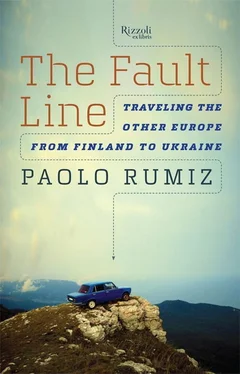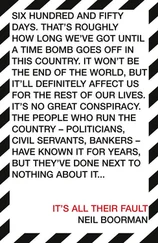We’ve been on the road now for seven hours, but Murmansk is still far away. Between one passing car and another, as many as ten minutes go by. A heavy, low sky and a diffuse sense of fear presses down on everything. We can feel eyes looking at us, and in fact, in the middle of nowhere, the signals on our cell phones remain perfectly active. Nature appears again after another fifteen miles or so. You barely have time to see a vegetable garden or two, cultivated by the people of Zapolyarny, and there’s another military base, hangars for hundreds of tanks, platoons with backpacks fully loaded, on the march. After Pechenga—more factories and the most Nordic railroad station in Europe—more barracks and tanks in plain sight. There’s even a monument to the tank. A MiG descends slowly, covers us with the prehistoric shadow of a pterodactyl, and vanishes among the birch trees to the southwest. A bathroom stop in a motel made of trailers poised on the terrain atop antisnow latticework grids. Superclean toilets with two women at the cash register who eat and chat as they keep watch over their realm. As they tear my admission ticket, they screw up their noses at the stench of Nikolai’s dried cod. Evidently, they no longer smell the odor of the sulfur that permeates the air for miles around the factories. We get back on the road, riding along a river that flows down from dark brown hills. On a long bridge, there’s a third checkpoint, then a sign indicating Staraya Titovka and the end of the off-limits zone, the one controlled by the FSP (ex-KGB). Only now can we get out of the bus, take pictures, go wherever we want. At least in theory.
Now the road is a toboggan run with curves and roller-coaster ups and downs, which back in Italy are called Russian mountains but here are called, unaccountably, American mountains. The bus threads itself into narrow ravines with monuments in memory of the conflict with the Germans from 1941 to 1944.
A terrible battle for Murmansk. I ask Knut how people manage to sleep in the summer with these days that never end. “Simple, you don’t sleep, it’s a law of nature.” That’s what the Norwegians do. In the winter they go into a sort of hibernation, and in the summer they manage to stay awake for five or six days in a row. He explains that in the North, in the summertime, animals grow faster than they do in the southern part of the country. Meanwhile, the road turns even worse; the signs of the human presence in the landscape are only ulcers, wounds, landslides. Nature is offended more here, precisely where it is most vulnerable, than it is in any other place on the planet.
The northernmost city in the world suddenly pops into view, white with huge apartment buildings, in the middle of barren hills and sleet. We’ve found a room in a hotel for the provincial nomenklatura, named Polyarniye Zori, Aurora Borealis. My fish is looked at askance at the reception desk, but this doubles the pleasure of the shower and the cabbage and paprika soup, and the glass of vodka that ends the day. I’m rather tired, in part because of the constant light that hammers away at my retinas and keeps me from sleeping, in part because, at my age, traveling with a backpack and public transportation is a crazy thing to do. But it doesn’t matter. It’s in the transitions that you encounter the world.
It happens at one o’clock in the morning. In perfect silence. An incandescent sword slips through the window curtains, sets fire to the glass of water on the bedside table, then paints a white vertical stripe on the psychedelic blue wall.
The sun. I turn over under the down blanket, and it takes me a while to realize where I am and what’s happening to me. The sun. This isn’t jet lag. It’s not a waking up from an overly long afternoon nap, or even a hangover. It’s the sun. The sun of the North. I’m in Russia, in Murmansk, on the fifth floor of the Polyarniye Zori, room 519, and the low light leaves me no escape, penetrates into the deepest part of my den, makes me furious as a bear rousted from hibernation. The only dark place is the bathroom, and I would shut myself inside there if I weren’t too tired to reorganize my sleep.
I’ve also lost my sense of direction. The compass on the bedside table says something impossible: the sunlight isn’t coming from the East but from the North. It’s in the north that the sun reaches its lowest point, and it’s in the north that it manages to transfix you the best. In the boreal lands the hour that blinds you is around midnight. I’m under the power of the luminous force that enchanted Weyprecht, hypnotized Fridtjof Nansen, Willem Barents, and Otto Nordenskjöld; the curse that killed Bering and other explorers of the frozen north. The North is a totalitarian dimension, and here in Murmansk, in these Soviet concrete bunkers made to crush man and give him no quarter, you feel it a lot stronger than in Norway.
And then there’s this fjord, oriented toward the Pole in such a perfect way that in the dead of night the thirty-first meridian seems to come down out of the sky in person to transform the last sliver of the Arctic Ocean into a fiery mirror. Here it is; now the sword of light pierces a hole in the room with a laser beam. It has cut its way inside in perfect silence, like a knife through a frozen cake; it is a power capable of slicing through darkness with the relentless force of an icebreaker. By the time three o’clock arrives, I’m hungry; at four thirty, I give up on trying to sleep and start jotting down notes. The hotel is already awake anyway. The hallway is abuzz with chatter, shouting, excited knocking on doors, cellular ring tones. There are no sleeping pills equal to the power of the Northern sun.
But at five o’clock, when I’m fully awake, the damn crack in the curtains switches off, and the room plunges back into semidarkness. I go over to the window to figure out what’s going on and I see that it’s snowing. The sky is leaden; flour is blowing down in oblique gusts among the apartment buildings of Murmansk. In the North, a dazzling night of sunlight can be followed by a day of tenebrous gray clouds; and insomnia, by narcosis. The illusion of a real night makes me collapse into somnolence, and I throw myself back under the down blanket and dream of gigantic Russian women with pagoda-style hair, a parade of enormous die-hard Communist matryoshka dolls in army boots.
The dreams of travelers are the easiest to decipher, and I owe them all to the waitresses at the hotel, monumental and aggressive as gladiators, who waited on our table the night before. The pianist had such big breasts that I don’t know how she could see the keyboard as she played Prince Igor . The waiters, on the other hand, were pale ephebic adolescents who responded to our orders in feeble voices, almost excusing themselves for existing. The dining room was full of spic-and-span Russian and American naval officers, visiting the Arctic naval base at Severomorsk. But in that case, too, the triumph belonged to their wives, oversize women in evening gowns garish in proportion to their husbands’ rank.
We get up late, when the breakfast room has already closed, and, all wrapped up, we go down toward the seaside through a labyrinth of stairs chipped and broken by the ice. The snow is coming down mixed with rain, and Murmansk begins in a tangle of ugly train tracks, hovels, containers, mud, apartment buildings, and strange garages, concentrated in crumbling ravines. The asphalt is terrible, riddled with holes like the road from Norway to here. But the people move with elegance. The men look like professors; the young women glide over the cobblestones in their spike heels without spraining an ankle, and it’s a mystery known only to the Slavs how they do it. I can feel myself being infused with slower times. Trains pass over the fish market: loaded-to-overflowing coal cars and military green passenger cars with curtains behind every window and a fuming smokestack at the head of every car, a sign that inside the heat is on.
Читать дальше












